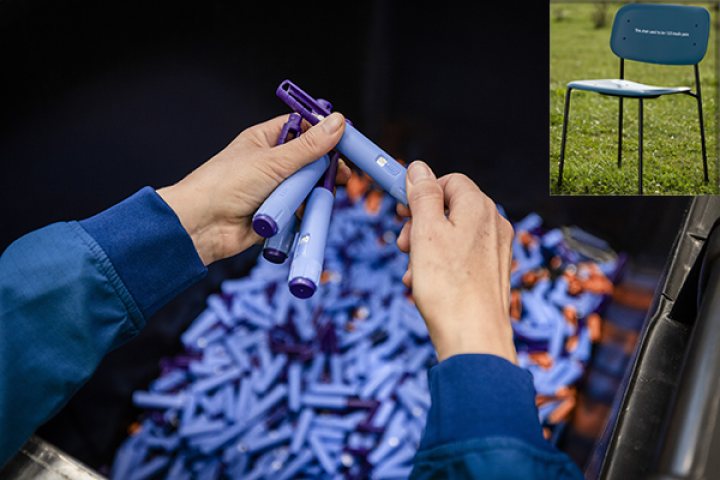An innovative insulin pen recycling scheme

This pen would improve the quality of life for people living with diabetes, whilst eliminating the need for bulky glass syringes. Almost 40 years later, the insulin pen is now an essential device for people living with diabetes. However, comprised of 77% plastics (PP, POM, PC/ABS), managing the end-of-life of these disposable pens is problematic. Given that they cannot be disposed of in a plastics recycling bin for obvious health reasons, they are generally incinerated.
A circular economic sector
Novo Nordisk has set itself the challenge of finding an end-of-life solution for these products; to transform them from waste to resource. This Danish healthcare company—which will soon celebrate its 100th anniversary—distributes 600 million disposable injector pens worldwide each year. This represents over 12,000 tonnes of plastic. To achieve their goal, the company has just announced the launch of Returpen™, the first recovery and recycling scheme for disposable injector pens, in France. This initiative is part of Novo Nordisk’s “Circular for Zero” environmental policy, and so far, it has been developed in 3 other countries: Brazil, Denmark and the UK. In Denmark, the two-year-old scheme has collected 77,000 pens, whilst 15,000 pens have been recycled in the UK since the scheme was launched in November 2021, and it hopes to recycle 700,000 pens by end 2023. The scheme is also being rolled out in the US, Japan, China, Germany and Italy.
Recycling and valorising millions of insulin injector pens
Patients can pick up a recycling pouch from a participating pharmacy or order one free of charge from the returpen.fr website. After using the pen, they remove the needle, place the pen in the recycling pouch or envelope and take the pouch back to the pharmacy or send the envelope back by post. The pens are then collected and sent to Denmark. There, they will be processed and recycled by Zirq Solutions, which has set up a specialised industrial process to recycle up to 85% of the materials and reuse them in the manufacturing of furniture. Hay, a world-renowned Danish design company, is responsible for designing these recycled plastic chairs, each made from 120 used pens. Thanks to another designer, glass from discarded insulin bottles will also be melted down and given a new lease of life, this time in the form of globe lamps.
Novo Nordisk hopes to eventually avoid transporting the pens back to Denmark by setting up a recycling process in France. By 2024, the company aims to collect 5 million of the 25 million pens used each year in France.
More information:
https://www.novonordisk.com




